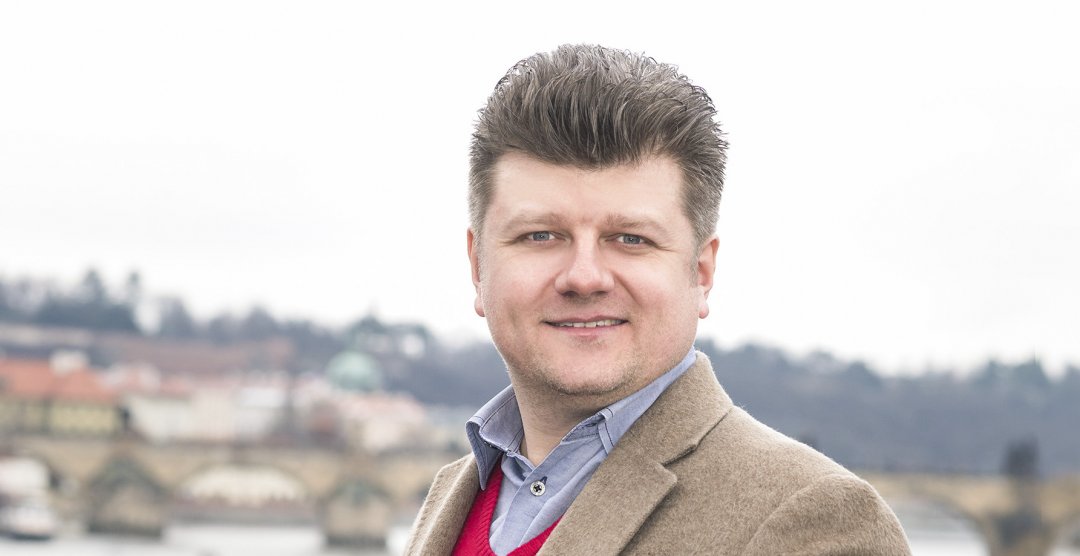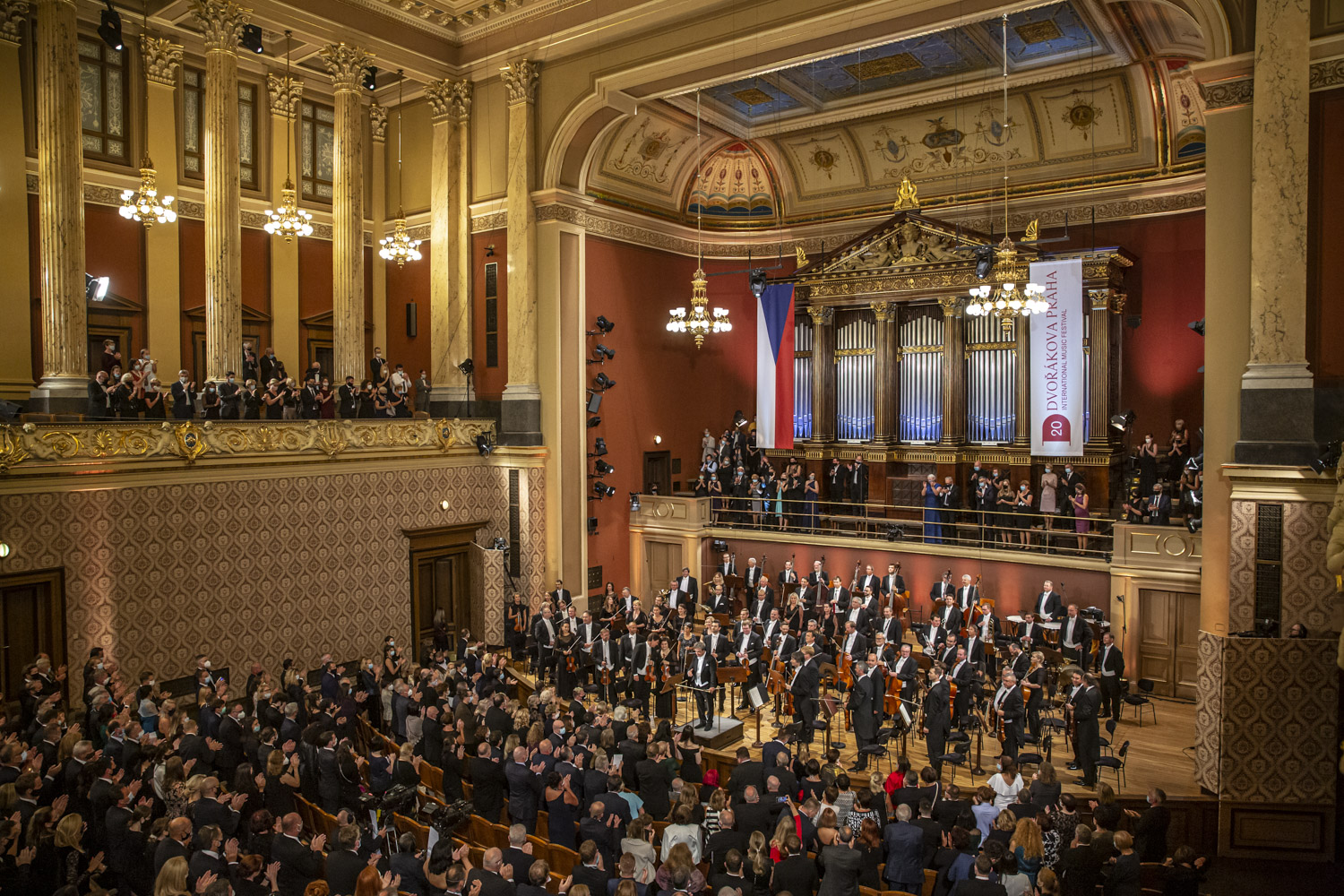
Wolfgang Amadeus Mozart: Concerto for French Horn and Orchestra No. 3 in E flat Major, KV. 447
Ondřej Brousek: Sinfonietta „La Petite Joie“
Jan Kučera: Concerto for Baritone Saxophone and Orchestra
Sergej Prokofjev: Symphony No. 1 in D major, Op. 25, ʻClassicalʻ
Two contemporary works surrounded by two classics – that is how the chamber orchestra Czech Sinfonietta will make its premiere appearance at the Dvořák Prague Festival. Leading the ensemble consisting of outstanding Czech instrumentalists will be its founder, the horn player and conductor Radek Baborák.Mozart’s French Horn Concerto in E Flat Major is enjoyable music for both the listeners and the soloist. With that work, Radek Baborák will open the concert in the dual role of soloist and conductor, as was usual in Mozart’s day. The composers Ondřej Brousek and Jan Kučera are fluent in a wide range of musical genres, but in the Czech music world they are known above all for their ability to communicate with audiences without barriers – regardless of whether the music in question is popular or classical. The public can look forward to Brousek’s Sinfonietta “La Petite Joie”, inspired by the group of Parisian composers known as “Les six”, and Kučera’s Concerto for Baritone Saxophone and Orchestra. Serving as a more modern, rather ironic reflection of the Mozart concerto is the concluding Symphony No. 1 in D Major (“Classical”) by Sergei Prokofiev. This music is clearly inspired mainly by Haydn and to a lesser extent by Mozart. Prokofiev himself imagined how his Classical Symphony would enrage his professors at the conservatory, who would have accused him of not letting Mozart rest in peace, and instead provoking him with dissonances. The result of this provocation is one of Prokofiev’s most popular works, which offers a wonderful opportunity to the talented players of the Czech Sinfonietta.
The Czech Sinfonietta was founded in 2010 by its artistic director, the French horn player and conductor Radek Baborák. The core of the orchestra consists of members of the Baborak Ensemble and soloists from the youthful generation in leading Czech ensembles and orchestras including the Wihan Quartet, the Herold Quartet, the Epoque Quartet, the Afflatus Quintet, the Czech Nonet, the Czech Philharmonic, the Prague Radio Symphony Orchestra, the Orchestra of the National Theatre, and the Prague Chamber Philharmonic. The ensemble's repertoire primarily includes the music of the high Baroque (Bach, Handel, Telemann), Classicism (Mozart, Haydn, Beethoven), Romanticism (Schubert, Mendelssohn, Brahms, Dvořák), and the first half of the 20th century (Ravel, Ibert, Respighi, Bartók, Prokofiev). The public and music critics alike admire above all the orchestra's youthful fervour, virtuosity, and stylistic persuasiveness. For the prestigious Japanese label Octavia Records, the ensemble has made recordings of symphonies and horn concertos by Mozart and Haydn. Most of the members also perform other genres such as jazz, ethno, and rock or are interpreters of music of the Renaissance or Baroque periods or of contemporary music.
The French horn player and conductor Radek Baborák is one of the most prominent musical personalities of the Classical music scene internationally. Since his solo debut in 1989, he has been collaborating with many of the world’s top orchestras and leading conductors. After serving for many years as the principal French horn player of the Berlin Philharmonic, and having been enriched by a great deal of experience in the field of chamber music and as the artistic director of ensembles (the Baborak Ensemble, the Horn Chorus, and the Afflatus Quintet), in 2008 he began a parallel career as a conductor. In doing so, he is following in the tradition of conducting instrumentalists who decided to realise their artistic ideas and dreams by conducting their own performances. Along these lines, Baborák’s main mentor and model is Maestro Daniel Barenboim, whom he assisted with the West-Eastern Divan Orchestra, and he has appeared as a soloist under Barenboin’s baton. He has taken part in chamber projects of the Boulez Ensemble, and he serves as a professor at the Barenboim-Said Academy in Berlin.
The initial impulse that led him to the conductor’s podium was being asked by the musicians of the Mito Chamber Orchestra to step in for their ailing chief conductor, Maestro Seiji Ozawa, on a European tour in 2008. Baborák became Ozawa’s pupil, and the highpoint of their work together came at the jubilee 100th concert of the MCO, at which Radek Baborák conducted the first two movements of Beethoven’s Ninth Symphony, then Seiji Ozawa conducted the third movement and the finale.
In 2011 he took the initiative in founding the Czech Sinfonietta, a festival orchestra, of which he is the chief conductor, and in 2013 he took over as the artistic director of the Prague Chamber Soloists. Since the 2017 season he has been the principal guest conductor of the Yamagata Symphony Orchestra, and since the 2021 season he is the chief conductor of the West Bohemia Symphony Orchestra in Mariánské Lázně.
Radek Baborák has worked with such orchestras as the Duisburg Philharmonic, the Deutsches Symphonie-Orchester Berlin, the Thuringia Philharmonic, the Rhine Philharmonic, the Malaysian Philharmonic orchestra, the Istanbul State Orchestra, the Mozarteum Orchestra in Salzburg, the Prague Radio Symphony Orchestra, the Prague Symphony Orchestra, and the Prague Philharmonia.
He is exceptionally popular in Japan, where he has conducted many orchestras including the New Japan Philharmonic, the Mito Chamber Orchestra, the Tokyo Philharmonic, the Nagoya Philharmonic, and the Kioi Sinfonietta.
As a conductor and soloist, he has appeared at such renowned festivals as Maggio musicale Fiorentino, the Mozartwoche Salzurg, the Pacific Music Festival, the Martha Argerich Festival in Beppu, the Prague Spring Festival, the Dvořák Prague Festival, and Smetana’s Litomyšl. He has accompanied such renowned soloists as Yefim Bronfmann, Guy Braunstein, Julian Steckel, Saleem Aboud Ashkar, Marie-Piere Langlamet, Jana Boušková, Clara Dent, Janne Saksala, Dalibor Karvay, Jan Mráček, and Ricardo Galliano.
Radek Baborák’s repertoire includes music of the Baroque, Classical, and Romantic periods and works of the 20th and 21st centuries by composers including N. Tamir, T. Hosokawa, J. Adams, E. P. Salonen, and A. S. Saario.
He has given world premieres of works by J.G.Páleníček, M.Bok, L. Hurník, and A.Březina as well as of his own compositions l’Orangerie and N.V.P.
Source: Česká sinfonietta

The renowned saxophonist Kateřina Pavlíková is engaged in a broad spectrum of musical activities. Since 1999 she has been a member of the Bohemia Saxophone Quartet, with repertoire encompassing classical music and jazz, contemporary compositions mostly dedicated specifically to the ensemble, and a large number of transcriptions, several of which Ms. Pavlíková has made herself. With the ensemble, she has taken part at many important music festivals including the Prague Spring Festival, Strings of Autumn, Hofkonzerte im Podewil Berlin, the Sächsisch-Böhmisches Music Festival etc. She has appeared as a soloist with orchestras including the Prague Chamber Philharmonic, the Brno Philharmonic, the Hradec Králové Philharmonic, the Moravian Philharmonic in Olomouc, the South Czech Philharmonic, and the Czech Chamber Philharmonic Orchestra in Pardubice. Her collaborations with Czech and foreign composers have led to several new compositions for baritone saxophone dedicated specifically to her. She is also intensively engaged in teaching activities. She teaches saxophone at the České Budějovice Conservatoire and at the Volary Elementary School of the Arts.
The Rudolfinum is one of the most important Neo-Renaissance edifices in the Czech Republic. In its conception as a multi-purpose cultural centre it was quite unique in Europe at the time of its construction. Based on a joint design by two outstanding Czech architects, Josef Zítek and Josef Schultz, a magnificent building was erected serving for concerts, as a gallery, and as a museum. The grand opening on 7 February 1885 was attended by Crown Prince Rudolph of Austria, in whose honour the structure was named. In 1896 the very first concert of the Czech Philharmonic Orchestra took place in the Rudolfinum's main concert hall, under the baton of the composer Antonín Dvořák whose name was later bestowed on the hall.
